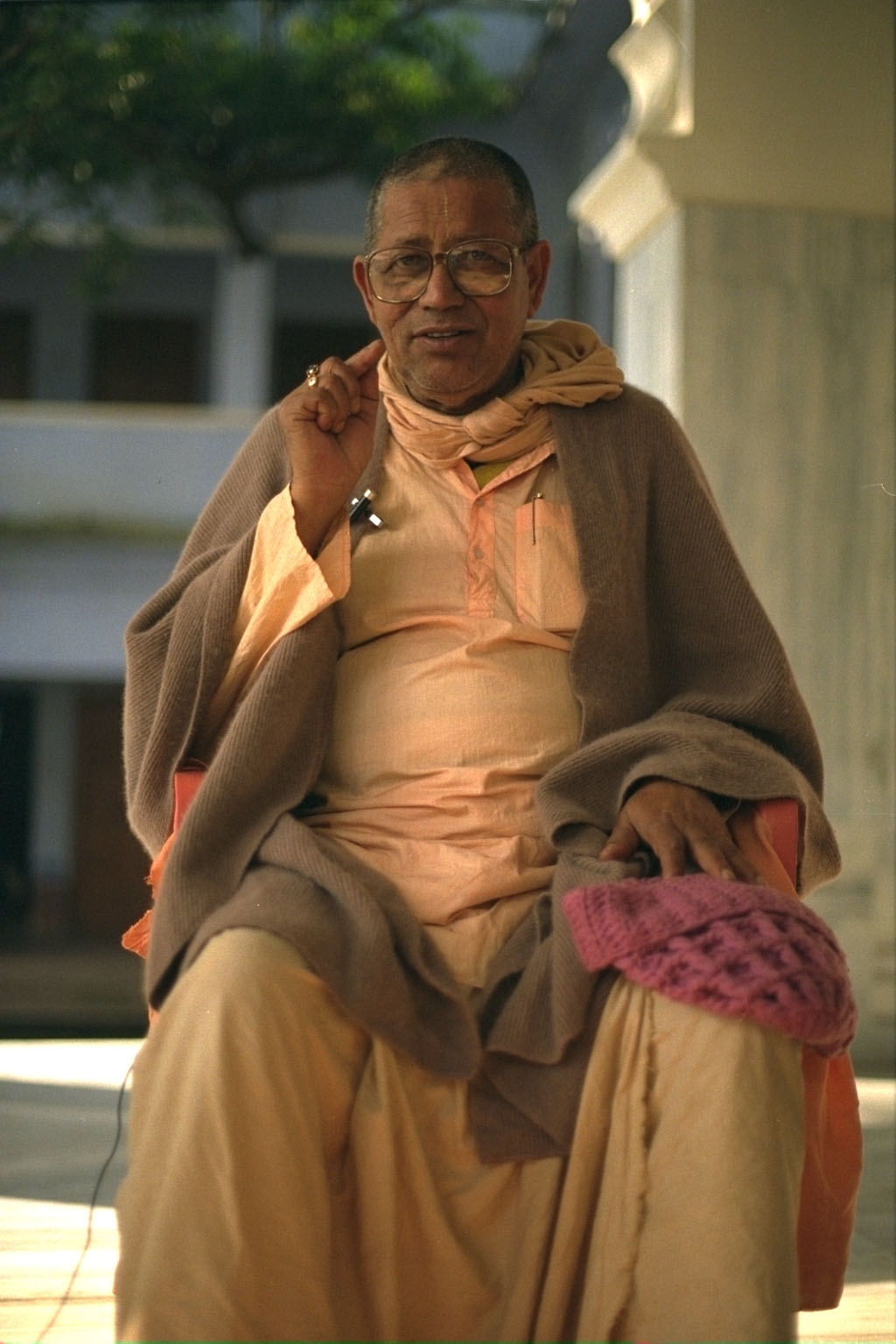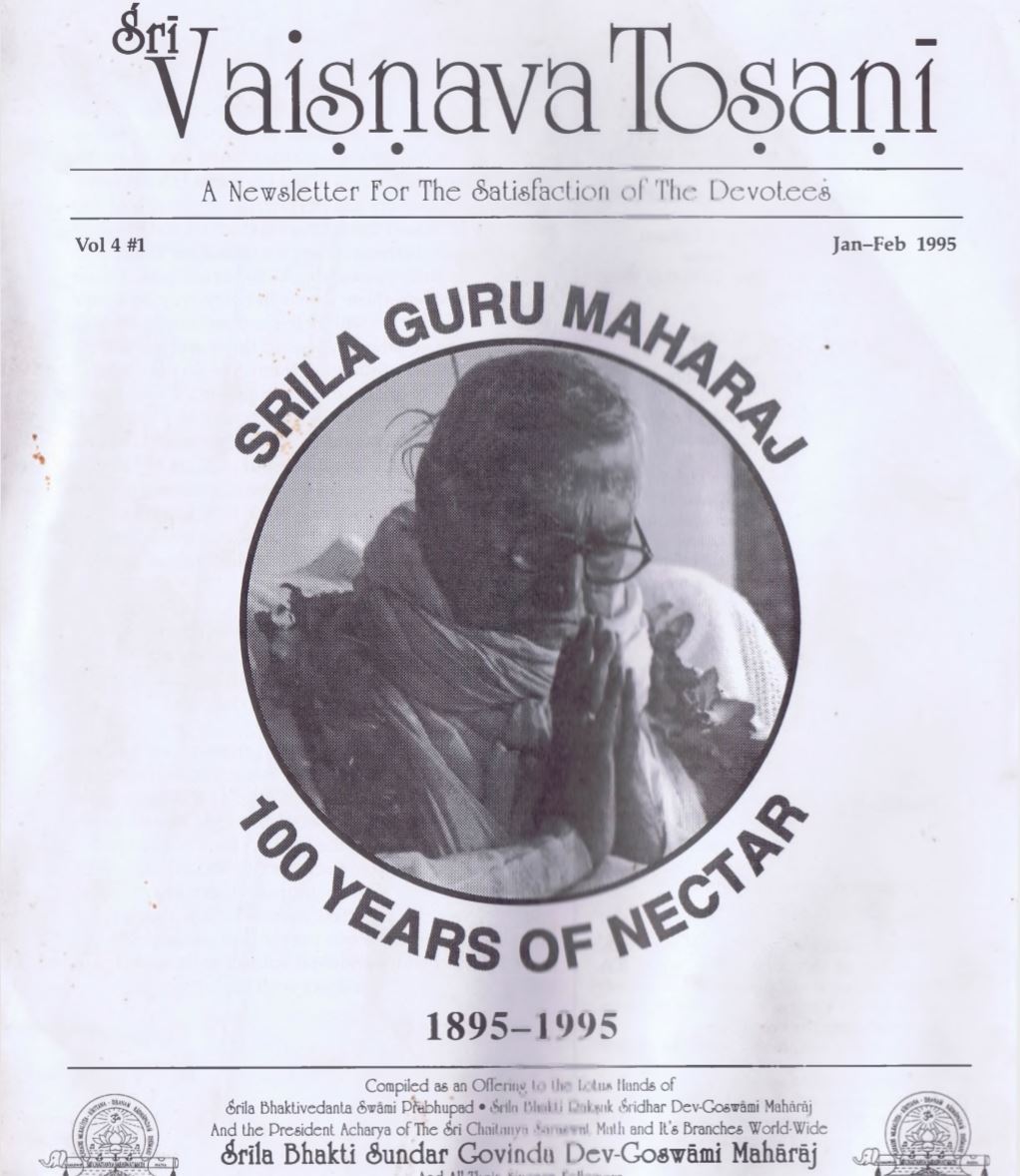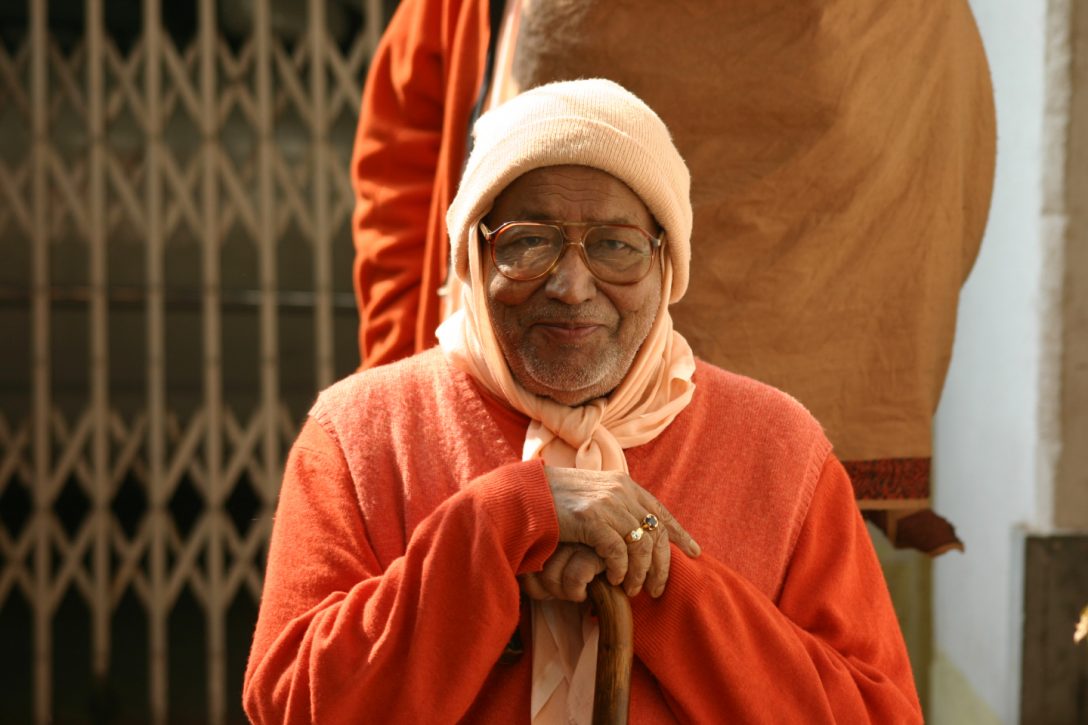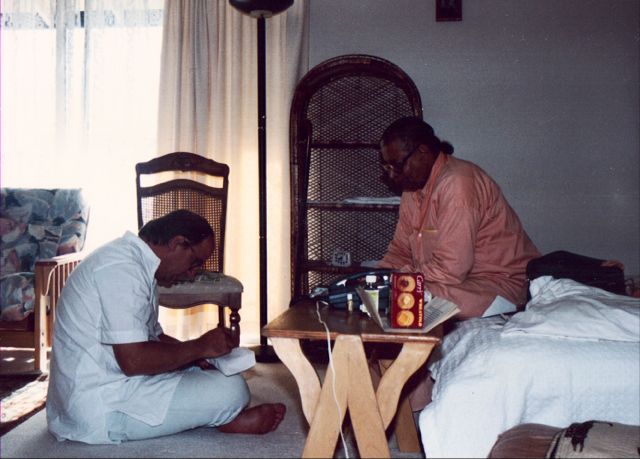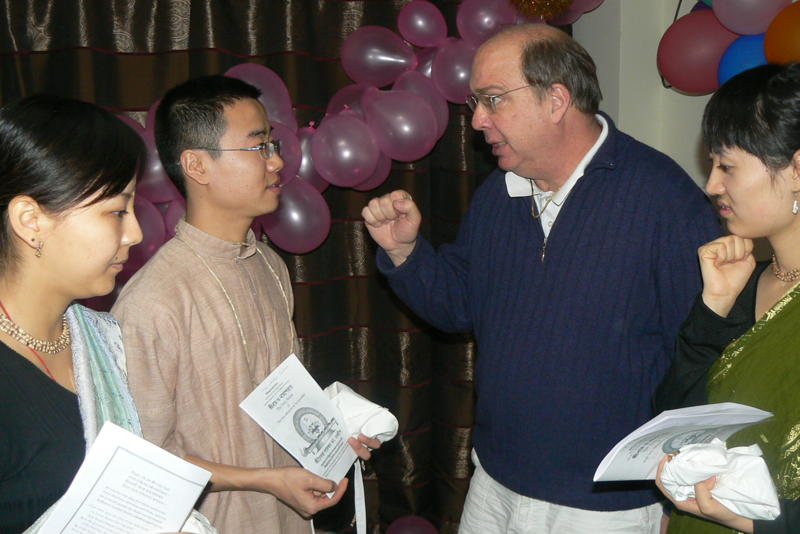Śrīla B.S. Govinda Mahārāj speaks on the need for harmonious dealings between different groups and missions within Krishna consciousness.
Śrīla Jājāvar Mahārāj and Śrīla Guru Mahārāj had completely separate moods, but in one way they are the same. That is that both are practising Kṛṣṇa consciousness, both are good devotees of Kṛṣṇa, and both are very sincere. I am seeing this from the middle point, not as Guru Mahārāj’s disciple. As a disciple of Guru Mahārāj, I must see my Guru as supreme, but I am not telling this in that way. This is through realisation. Sometimes both would fight heavily—I do not want to tell about that type of fighting—but that reaction did not come to me, and this is what I want to establish in my friends’ heart.
Śrīla Guru Maharaj would debate with his godbrothers in a very high way. He would debate with Swami Maharaj in Kolkata, on some days up to two o’clock. And in Nabadwip, Jājāvar Mahārāj would come for discussion with Guru Mahārāj and stay for one month or two months in Chaitanya Sāraswat Maṭh, only for discussion in the matter of Kṛṣṇa consciousness. Śrīla Guru Mahārāj is an ocean of transcendental knowledge and Guru Mahārāj’s godbrothers knew that if they came to Guru Mahārāj, they would be satisfied. Until they reached satisfaction, they would debate with Guru Mahārāj, and heavily debate. The effect of that could come to us in a negative way, but it did not; that effect always came to us in a positive way. It is the mercy of Jājāvar Mahārāj and the mercy of Guru Mahārāj. You see my application of their names: first I gave the name of Jājāvar Mahārāj, and then I gave the name of Guru Mahārāj. Do you understand? This is the proper application.
Why has this mood come to us? It has come to us by the mercy of Śrīla Guru Mahārāj. I am always giving my obeisance to Jājāvar Mahārāj, and always giving my obeisance to Śrīla Guru Mahārāj. They are showing different moods, but from those different moods, we are not getting any negative feeling. How shall I give this mood to my friends and brothers? I am always thinking about that. This is the only thing that can save us. Otherwise nothing can save us. I heard many things from Jājāvar Mahārāj, and I heard many things from Guru Mahārāj also. When they would debate they were fighting, but we did not lose our śraddhā, our faith, to Guru and Vaiṣṇava. We did not think that Jājāvar Mahārāj is bad and Guru Mahārāj is good. We would never think that, although they would take completely different lines. Sometimes one would take what could be considered a nastik, atheistic, line, and another would take a theistic line.
The godbrothers of Guru Mahārāj were all great paṇḍits and highly qualified, and they all came often to see Guru Mahārāj. We can name that Vaikhānas Mahārāj: he was a great paṇḍit and highly qualified. When they came, they would debate with Guru Mahārāj, and questions and answers were always going on, sometimes for the whole day. They would eat, rest, and then again go to Guru Mahārāj for questions and answers. Their discussion would go on in a challenging way, not an asking way: they wanted to know from Guru Maharaj. Some of them were senior to Guru Maharaj, but they would ask Guru Mahārāj. They needed some conclusion of the fact. They would debate scriptural matters and many things with Guru Mahārāj. But I did not lose faith with them: I have full regard for Goswāmī Mahārāj, full regard for Mādhav Mahārāj, and full regard for Vaikhānas Mahārāj. There were many qualified Mahārājs there, and they all looked at me as their boy. They were not thinking, “He is a disciple of Śrīdhar Mahārāj, he is a disciple of another.” When they came, they also brought some disciples with them. Somebody brought two disciples, somebody brought four disciples; but we did not feel at that time that, “I am one group, he is another group.” When Jājāvar Mahārāj’s disciples came we behaved with each other like twin brothers. We had very nice feelings between us. When any godbrother died, Guru Mahārāj was crying, and not only outwardly crying, but heavily crying. He would become sick. Guru Mahārāj had that type of affection for his godbrothers. When we heard that Jājāvar Maharaj’s disciple Bhaṭṭa Kṛṣṇa died, Goswāmī Mahārāj’s disciple died, and the disciples of other Mahārājs, then we would also cry for them.
Why can we not establish this type of relationship now? I do not understand. Actually, I know where there is a gap, but I cannot fill up that gap. I am trying to fill that gap. I went to the West, and I told this conception in another way. This morning someone said that I did not come with party feelings; I came to the West to establish our Gurus’ conception, and that is the supreme conception. I did not come for taking sides. I am not a campaign-man, and we have that feeling from our birth.
When I joined, the next day Kṛṣṇadās Bābājī came to see Guru Mahārāj, and Guru Mahārāj asked Kṛṣṇadās Bābājī, “See this boy. This boy told this, this, this, this, this, and you know about that. You examine this boy.” What good feelings! Kṛṣṇadās Bābājī examined me in many ways in song. At that time I had told that I know Vaiṣṇava songs, and Kṛṣṇadās Bābājī knew many songs, more than Guru Mahārāj.
He examined me in many ways, and he told, “Yes Mahārāj, he knows something.” They were happily talking.
When Guru Mahārāj heavily told something to Kṛṣṇadās Bābājī Mahārāj I was very sad, and I gave objection to Guru Mahārāj: “Why did you tell this?” I had a very close relationship with Guru Mahārāj and I could say anything to Guru Mahārāj. That was our relationship. I asked, “Why did you tell this to Bābājī Mahārāj? He is always helpful for our Mission, always affectionate with you, is keeping high regard in his heart for you, but you behaved like an ordinary man, and it is giving me pain.”
That was when Guru Mahārāj sent him out from the Maṭh; and Guru Mahārāj’s answer was very high thinking. Guru Mahārāj said, “I cannot make offence to my Guru. Prabhupād Sāraswatī Ṭhākur did not want that any of his disciples will go to hear sahajiyā kīrtan, and he is going to do that. He may be my best friend, but not more than Prabhupād.” This was Guru Mahārāj’s answer. “Prabhupād Saraswatī Ṭhākur did not like it, and he is my best friend. Why is he doing it? I told him many times, but he is not listening. Then, it is very difficult, very difficult to tell him, but I must tell, otherwise I will make offence to my Guru.” Guru Mahārāj was also crying, his heart was crying, but he could not ignore his Guru. We have got that type of feeling for Vaiṣṇavas, for Gurus, for godbrothers.
I received a letter this morning from a disciple of Śrīla Swāmī Mahārāj, and he stated many times in the letter, “Your Guru Mahārāj and my Guru Mahārāj, your Guru Mahārāj and my Guru Mahārāj, your Guru Mahārāj and my Guru Mahārāj”. We are not habituated with this conception, and we are not speaking in that way. This is making differentiation, “Your Guru Mahārāj and my Guru Mahārāj.” This is not a good conception, but they are habituated with that conception, and that is the difficulty. It is necessary to remove this conception. We are all in one family. That conception should come first.
My father, my uncle, my grandfather, my uncle’s son, and my nephew—we are all in one family. Why will we quarrel? This is the first thing. The second thing is that if anybody is going a different way, we will try to keep them in our sampradāya with a harmonising mood. That will be good for our society. We are very few in this world: there are three hundred crores of people [one crore is ten million], but how many are we in Kṛṣṇa consciousness? Very few. There is no percentage, maybe zero point zero, zero, five (0.005%), and if we quarrel, then how can we try to spread Kṛṣṇa consciousness?
Some persons took initiation from me in Guadalajara, and the Iskcon guru came immediately and talked with me and was happy with me. He said to me, “Mahārāj, those persons took initiation from you, but they are serving in our Iskcon Mandir. Now they are your disciples. Then what is your desire? They will serve Iskcon or not?” He directly asked me.
And I told him, “Why will they not serve Iskcon? I cannot understand. They are doing service in Iskcon and I think it is very good. They can serve. But you also must be sober with them, and don’t abuse Guru–Vaiṣṇava in any way to them, and they will happily serve you.” This is the real conception.
Many of the sannyāsīs came to see Guru Mahārāj, and with those sannyāsīs many of the devotees also came, but we never abused their gurus and we never thought that they were outside of our society. We are thinking we are in one family: he is my uncle’s son, he is my brother, he is my cousin. Our friends are going in this mood, and sometimes the disciples of other Mahārājs are coming to our Maṭh to see me. Parvat Mahārāj, Goswāmī Mahārāj, Mādhav Mahārāj, Jājāvar Mahārāj: their disciples are coming to see me sometimes, and if you see our mood, you will be surprised. You cannot understand that he is not a disciple of Guru Mahārāj, and that I am not a disciple of his Guru. Our relationship is going in this way, and with this feeling, we are happy with our family.
I am always thinking, thinking, thinking of this, and every day this is my headache. Many letters come from the West, and all the letters are not very sweet. Some letters are a little bitter, some letters are a little sour. Many things are in those letters. The man who wrote this morning was inspired when I went to America. He was alone. Now he wants to come in our society and see my preaching mood. But his mood is always, “My Guru, your Guru, my Guru, your Guru.” It is first necessary to remove this. Guru is one. Our feelings will come that way and it is not necessary to take the name of his Guru, and it is not necessary to take the name of my Guru. We are all brothers.
The ‘Sonhood of Godhead’ is living in the middle. That is Mahāprabhu’s conception, the ‘Sonhood of Godhead’. ‘Sonhood’ means that he has a father and a mother; he has uncles, sisters, nephews; he has friends, he has servants; he has many things. He is living in the centre and the family is around. That is the Sonhood of Godhead, and we are the servants of the servants of Godhead. That is Kṛṣṇa, Nanda-gopa-kumārāya: He is the son of Nanda Mahārāj, and we are worshipping Him. Then, it will be a very happy thing if we can make our relation with everyone harmonious and good.
This article has been prepared from an informal discourse given by Srila B.S. Govinda Maharaj in Kolkata, India, December 1992. The original recording is available here: https://www.youtube.com/watch?v=we67kgX_5k4&t=556s
And a raw transcript as well as audio file is available here:
http://jayasri.org/kolkata-dec-1992/



